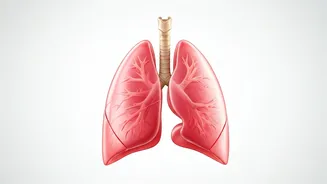Breathe Deeply, Regularly
The very act of breathing can be optimized for enhanced lung capacity. Deep breathing exercises are fundamental. Techniques like diaphragmatic breathing (belly
breathing) maximize the use of the diaphragm, a crucial muscle for respiration. Inhale deeply through your nose, allowing your belly to expand. Exhale slowly through your mouth. This technique, done regularly, gently stretches the lungs, increasing their capacity over time. Another valuable practice is pursed-lip breathing, especially beneficial during times of breathlessness. Inhale normally, then exhale slowly through pursed lips, which helps to keep the airways open longer and release trapped air, thereby maximizing oxygen exchange and expanding lung functionality. Regular practice of these techniques strengthens respiratory muscles and improves oxygen intake, fostering a healthier respiratory system, and creating an improved ability to function in day-to-day activities with greater respiratory efficiency. These breathing exercises are simple yet impactful tools for anyone seeking to improve respiratory health.
Healthy Lifestyle Choices
Lifestyle choices significantly affect lung capacity. Quitting smoking is paramount; it's the most effective single step towards healthier lungs. Smoking damages the alveoli, the tiny air sacs in the lungs, reducing their capacity to exchange oxygen. Avoiding exposure to pollutants and irritants, like air pollution, dust, and chemicals, is equally important. These irritants can inflame and narrow the airways. Maintaining a healthy weight also plays a crucial role. Excess weight puts additional pressure on the lungs, making it harder to breathe efficiently. A balanced diet, rich in fruits, vegetables, and whole grains, supports overall health, including respiratory function. Regular physical activity is key, as it strengthens the respiratory muscles, improving oxygen uptake. By incorporating these healthy habits, one can significantly improve lung capacity and protect their lungs from further damage. It is a proactive approach toward long-term respiratory health and a higher quality of life, allowing one to breathe more freely and fully. This holistic approach ensures comprehensive lung health improvement.
Exercise for Lung Health
Physical exercise is a powerful way to expand lung capacity. Aerobic exercises, such as running, swimming, and cycling, challenge the lungs, forcing them to work harder and more efficiently. Regular aerobic activity improves the body's ability to use oxygen. During exercise, your body demands more oxygen, leading to deeper breaths and improved lung function. This process strengthens the respiratory muscles, enhancing their capacity. Incorporating interval training, where short bursts of high-intensity exercise are interspersed with rest periods, can also significantly boost lung capacity. Furthermore, exercises like yoga and Pilates can be particularly beneficial. These practices often incorporate controlled breathing techniques and movements that improve posture and flexibility, indirectly supporting optimal lung function. By making exercise a consistent part of your routine, you can increase lung capacity and improve overall respiratory health, leading to greater stamina and energy levels, along with a significant improvement in overall wellness, allowing individuals to perform daily tasks with less effort and more ease.
Posture Matters Greatly
Proper posture is often overlooked, but it greatly influences lung capacity. Slouching or hunching restricts the lungs, limiting their ability to fully expand and reducing oxygen intake. Maintaining good posture allows the lungs to have enough space to expand. Stand and sit up straight, with your shoulders relaxed and your chest open. This position helps maximize lung capacity. Correct posture also benefits the diaphragm, enabling it to move more freely, leading to deeper and more efficient breathing. You can easily correct posture throughout the day, and it requires consistent awareness of your body position. Regularly practicing postural exercises, such as chest stretches and shoulder blade squeezes, can enhance posture and promote better respiratory function. Being mindful of your posture helps to avoid the constriction of the lungs, supporting effective breathing. Correct posture provides the foundation for optimal lung function, leading to improved respiratory health, energy, and overall comfort.
Hydration and Lung Capacity
Adequate hydration is critical for maintaining healthy lungs. Staying well-hydrated keeps the mucus in the airways thin and easier to clear. Mucus traps dust, allergens, and germs, protecting the lungs from potential harm. Dehydration can thicken this mucus, making it difficult to clear, which can obstruct the airways and reduce lung efficiency. Drinking sufficient water throughout the day ensures the lungs' natural defense mechanisms function properly, allowing for clear and effective breathing. The amount of water you need depends on factors like your activity level and the climate you live in, but a general guideline is to drink at least eight glasses of water daily. Hydration also supports overall health, promoting the efficient transport of oxygen throughout the body and improving energy levels. Staying hydrated not only benefits your lungs but also contributes to better overall health and wellbeing. It provides for optimized respiratory function and facilitates a more comfortable breathing experience.













